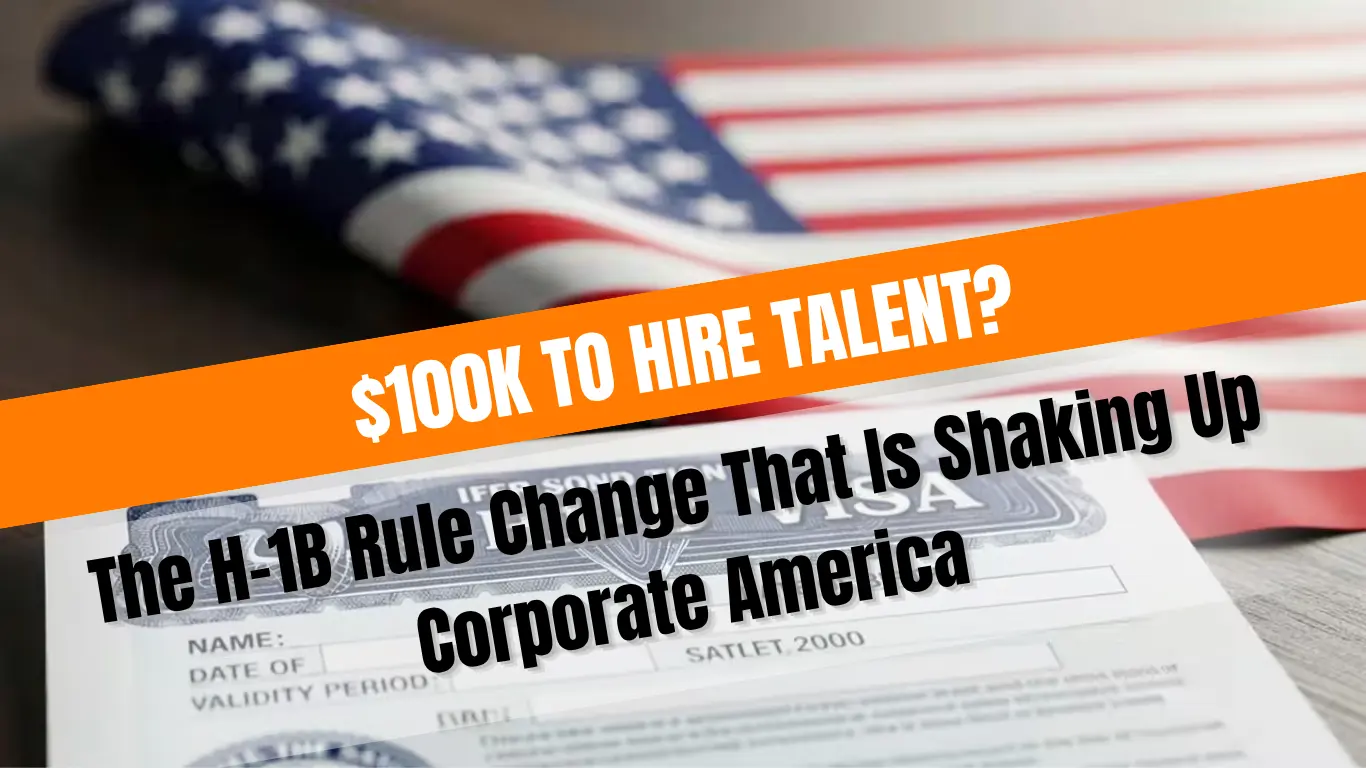
The Trump administration has succeeded in shaking up the corporate world with the shocking $100,000 H-1B application fee which became effective September 21, 2025. As anticipated, it is causing an upheaval in the process of acquiring hi-tech talent. Near-term impacts include a slowing down of the hiring process and a narrowing of the recruitment pipeline. And its Small and Medium Sized Businesses (SMBs) and growth stage startups that are being impacted the most. The idea behind the H-1B fee is to prevent abuse of the program, and protect American jobs. However, the ripple effects this move is set to have across industries, budgets, and global talent acquisition is gradually becoming apparent.
Let's take a look at this new visa rule and the impact it's having on businesses since it came into effect.
What Changed in the H-1B Rule?
Under the new rule, any employer seeking to hire a foreign worker on an H-1B visa must pay a one-time fee of $100,000 at the time of petition submission. This applies exclusively to new H-1B petitions for individuals outside the U.S. as of the effective date. Notably, this fee does not affect existing H-1B holders, visa renewals, or petitions filed before the deadline
Prior to this change, the H-1B visa program had undergone several modifications over the years and carried administrative charges totaling around $1,500.
The introduction of the $100,000 fee represents a significant departure from these previous rules, marking a substantial increase in the cost of hiring foreign talent.
Why This Change Matters
The H-1B program has long been the way tech, healthcare, engineering, and finance sectors acquire personnel from abroad. By tying visa access to a huge fee, the rule is going to alter corporate hiring practices, compensation models, and even how companies define “value” in talent acquisition.
It's also a sign that the U.S. is tightening its grip on who gets to work here, and under what terms.
1. A Major Impact for Tech Giants
Companies like Google, Amazon, Microsoft, and Meta, which rely heavily on H-1B workers, are now facing significant financial implications. For instance, Google employs over 4,100 H-1B workers and is the sixth-largest visa sponsor in the country. The new fee could deter these companies from hiring foreign talent, potentially narrowing their talent pool and impacting innovation and competitiveness.
2. Potential Talent Drain
The steep fee may force skilled professionals from countries like India and China to reconsider opportunities in the U.S. and opt instead for more accessible markets in Europe and the Middle East. This shift could lead to a talent drain from the US, with countries like Canada and the UK emerging as more attractive destinations for tech professionals.
3. Economic Implications
While the administration argues that the fee will protect U.S. workers by reducing the influx of foreign labor, critics contend that it may have the opposite effect. The tech industry, in particular, has been a significant driver of the U.S. economy, and any disruption could have far-reaching consequences.
The Ripple Effect on Corporate America
The $100,000 fee for new H-1B visas is prompting companies, particularly startups and mid-sized firms, to rethink their reliance on international talent.
- Investor-backed startups and growth-stage firms are facing increased pressure, as the steep fee threatens to price them out of global recruitment.
- Talent pipelines are narrowing, with fewer skilled foreign workers entering the U.S. job market, particularly in tech, engineering, and finance.
- Innovation risk is rising, and industry leaders warn that limiting access to global expertise could erode America's competitive edge in research and development.
- Hiring strategies are shifting toward automation, outsourcing, or relocating roles to countries with more favorable immigration policies.
The ripple effect caused by the huge increase in H-1B visa fees is likely to become more apparent in the coming months, impacting everything from workforce planning to product timelines.
Increase in Global Competition: Will Talent Go Elsewhere?
If the U.S. becomes too expensive or too exclusive, global talent may move to Canada, the UK, Australia, or remote-first companies. These markets are already courting skilled workers with more flexible immigration policies. In fact, Germany has already made official statements about increasing its efforts to attract professionals from abroad with more visas and better pay.
Hence, the conundrum before US businesses is a choice between whether they can afford to hire and whether they can afford to lose out to foreign competitors.
Impact on Tax & Financial Planning
From a tax perspective, acquiring premium talent from abroad will lead to paying higher salaries. This will in turn:
- Increased payroll tax obligations
- Possibly shift deductible expenses
- Attract greater scrutiny on business compensation structures
Companies will need to revisit their budget allocations, cash flow models, and long-term hiring forecasts. If you think this is just a compliance issue that's easily sorted out, it's not. It's more of a planning and strategizing imperative. Moreover, with further H-1B visa changes expected in early 2026, companies must remain agile and prepared to swiftly recalibrate their hiring strategies.
Summing up
The introduction of a $100,000 fee for new H-1B visa petitions marks a significant shift in U.S. immigration policy. As the details regarding the new H1B visa policy unfold, its impact on innovation, economic growth, and the tech industry's global standing will become increasingly apparent.
All things considered, the new visa fees seem to be working as the government intended in the short run, redefining how corporate America thinks about talent, growth, and global reach. However, the long-term impact could be far more complex, potentially hampering innovation, narrowing the pipeline of global expertise, and prompting companies to relocate roles or rethink expansion strategies.
For businesses, hiring premium international talent under new H-1B visa rulesnew H-1B visa rules brings with it higher salary costs, increased payroll tax burdens, and tighter scrutiny on compensation structures. This calls for a strategic recalibration of budgets, cash flow, and long-term hiring plans, with proactive financial planning becoming a critical requirement for growth.
FinloTax: Your Trusted Partner in a Changing Regulatory Landscape
At FinloTax, we specialize in helping businesses adapt to regulatory changes with confidence. From tax planning and payroll forecasting to cross-border hiring strategies, we're here to make sure your talent investments stay smart, compliant, and future-ready.
Let's talk about how the new H1B visa rule could impact your bottom line and how to stay competitive in a changing landscape. Call 4088229406 to get in touch with our experts.

